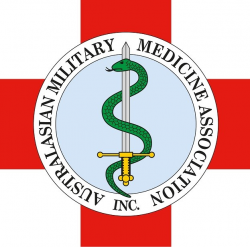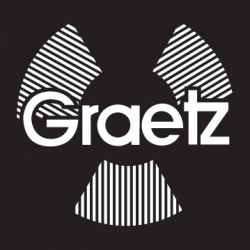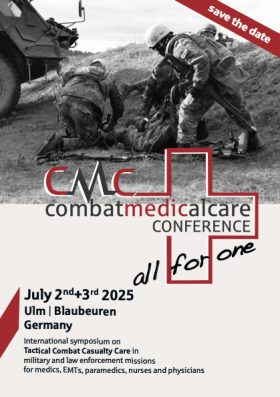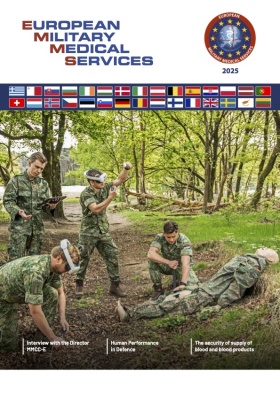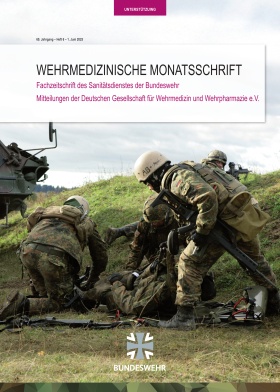
Interview: Martin Bricknell
The NATO response to the COVID-19 pandemic - Interview with Brigadier General Zoltán Bubenik
This is one of a series of interviews conducted by the Editor-in-Chief with key medical leaders within the NATO health system to record their experiences and insights from the COVID-19 crisis.
Date: 20/01/2022
Interviewer: Lt Gen (Rtd) Prof. Martin Bricknell, Editor-in-Chief, military-medicine.com
Interviewee: Brigadier Zoltán Bubenik, past Chairman of COMEDS and Czech Surgeon General
Bricknell, Martin:
Please could you describe your role as chairman of COMEDS?
Zoltán Bubeník:
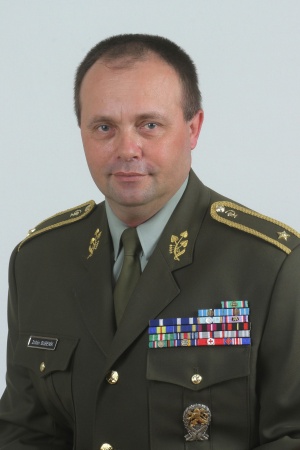
I held the position of COMEDS Chairman from December 2018 until December 2021. This is a three-year position as the most senior leader of the military medical services within NATO. The position represents all Surgeon Generals within NATO and acts as the principal medical adviser to the NATO Military Committee. The key role of the COMEDS Chairman is to advise on the tactical, operational, and strategic issues concerning the medical services of NATO members to the Chairman of the Military Committee and the Chiefs of Defence of our armed forces. During my tenure, I remained in the position of Surgeon General of the Czech Republic armed forces. So, my activities as a committee chairman were informed by my experiences as a Surgeon General of a NATO member.
Bricknell, Martin:
Prior to the start of the COVID crisis, what messages had COMEDS been communicating to the military committee about NATO's medical services?
Zoltán Bubeník:
Previously, direct communication from COMEDS to the Military Committee, the Chairman of the Military Committee, the Director General International Military Staff DG IMS), and other senior leaders in NATO was relatively rare. My predecessor, Major General Robert Bernier from Canada established a programme of regular briefings to the military committee. The period of my chairmanship was heavily influenced by the COVID situation, resulting in even more frequent reporting to the Military Committee on medical issues. Unfortunately, most of my reports were via teleconferences due to the COVID situation. I hope that it will be possible to return to face-to-face briefings soon.
Bricknell, Martin:
What do you see has been the involvement of COMEDS as a committee, and the NATO medical structure, in the military response to the COVID pandemic?
Zoltán Bubeník:
I should elaborate on the NATO COMEDS structure (a diagram is available at the COMEDS webpage of the NATO Military Medical Centre of Excellence website at https://www.coemed.org/resources/comeds). The COMEDS Plenary is the highest authority, which is endorses key NATO medical documents, standardization documents, tactical advice etc for implementation within member countries. This is necessary to maintain the maximum cooperation between the medical services of NATO members. Below the COMEDS Plenary, the key body is the COMEDS Steering Group. Before the COMEDS Plenary, the COMEDS Steering Group reviews all the reports of the COMEDS working groups, panels and expert teams, and submits advice to the COMEDS Plenary for endorsement and establishing the way ahead. In my NATO role, the Medical Advisers of NATO Operational Commands and the Strategic Commands, SHAPE and ACT, advise me of the medical issues within the NATO structure and operations.
Bricknell, Martin:
How did COMEDS as a group specifically demonstrate its value during the COVID crisis?
Zoltán Bubeník:
Let’s consider this from the perspective of “what has been delivered to the military committee”? Some advice covered the tactical aspects of measures to mitigate COVID, which had a strategic impact on the daily business of NATO organisations. At the operational level, the NATO medical community provided updates on the COVID situation to answer the questions - “how is the COVID crisis evolving in member states”, “how is it evolving in NATO deployments” and “how does it affect decisions at the levels of the Strategic Commands and the NATO Headquarters in Brussels?” Much of this is the responsibility and the daily business of the IMS Medical Advisor. He organises the collation of information from national military medical services and recommendations of civilian organizations. He also consults across the medical expert groups under the COMEDS responsibility. He is in daily contact with the DG IMS, in weekly contact with some permanent groups under the Military Committee, and regularly reports to the NATO civilian structures. So, he acts as the representative of COMEDS and is also a regular member of the COMEDS Plenary. As Chairman of COMEDS, I was responsible for deeper assessment of the strategic issues with some prediction of the future situation though my regular briefings to the Chairman of the Military Committee.
Bricknell, Martin:
What contributions have military health services made towards the national and international response to the COVID pandemic?
Zoltán Bubeník:
Across member states, our military health services have some universal similarities and are working within the universal principles of military medicine. However, the detailed relationships between the civilian and military parts of a Ministry of Defence, and the cooperation between military health services and the civilian Ministries of Health and other civilian institutions varies between countries. The COVID situation has reminded us of the importance of military medical services at the national strategic level, and of course, they remain important during deployments for NATO operations. The COVID pandemic was not restricted by national borders, so the involvement of military medical services in support of civilian health services both in their home countries and at the international level with NGOs and other organizations, and, of course, with the European union was very important. This is about civilian-military cooperation as part of national crisis response, though the nature and extent has varied between countries. Even if we have individual differences between our military medical services, all have been actively involved at the national level with supporting the civilian response to COVID.
Bricknell, Martin:
And is there anything particular about how the NATO military medical community contributed to national responses that you think is important for the future?
Zoltán Bubeník:
I would like to highlight the role of the Military Medical Centre of Excellence (Mil Med COE). During the first wave of the pandemic, between March and May 2020, it hosted a series of VTCs for representatives of our NATO military medical services to share their national experiences, their first insights, and the involvement of their military medical services. This was very valuable to provide a shared view of the crisis and reinforced the value of regular meetings, even if these moved from physical meetings to videoconferences. It was clear that no one had personally experienced a similar pandemic. Of course, the flu pandemic after World War I is too far into history. The COVID crisis is a good example of a real hybrid threat. This tiny virus has influenced the thinking processes of our people and has the potential to divide our societies into two sides, positive or negative, or optimistic or pessimistic. This also showed us how the virus can affect not only the health status and the activities of the medical services, but also influence the economy, the education, and even all aspects of our daily life across our countries.
Bricknell, Martin:
And is there anything at the more tactical or practical level that you think are lessons for military medical services from this experience?
Zoltán Bubeník:
During the first wave and the beginning of the second wave, the coronavirus had such severe clinical effects that the numbers of patients overwhelmed the bedding capacities of many hospitals. In some countries we are not prepared for this from the tactical point of view. Issues over the lack of the ventilators, lack of the medical devices, and of course, the lack of adequately trained and educated personnel have emerged. Even after military and military medical services were invited to provide help to the civilian services, there were still limited resources. We then started to discuss some form of international hub. From the tactical point of view, this is about supplies of ventilators and other devices. We managed to get some supplies from stockpiles, some from donations, and some from exchanges between the countries. Some of these arrangements were bilateral and some were supervised through NATO or the European Union using the NATO Euro-Atlantic Disaster Response Coordination Centre. As the Czech Republic Surgeon General, I was extremely grateful for the assistance that colleagues from the UK, United States, French and Germany provided to the Czech Republic during the pandemic. However, when the virus started to affect almost every country equally, there was limited capacity to exchange equipment or experienced medical personnel between countries.
Bricknell, Martin:
Linked to that, do you think there are any wider lessons about standardization and commonality between military medical services?
Zoltán Bubeník:
You might recall the Ebola crisis of 2014/15. On the COMEDS level, we started to discuss the need to be prepared for similar scenarios. We refreshed our standards and guidance about Chemical Biological Radiological and Nuclear (CBRN) issues especially related to biological responses from the military perspective. So, for the war agents, we are prepared, we have a standard, and we are trained for these scenarios. However, we were less sure if we were prepared for natural outbreaks of a disease. We were starting to discuss pandemic plans in NATO countries. The COVID crisis has showed us that we were prepared for historic examples, but not for future crisis from diseases like COVID. Within COMEDS, we now working on the strategic formal bio-response documents, which will be the umbrella to cover national plans. We will cover not only medical services, but wider military capabilities, and of course, the military and the civilian decision-makers at the NATO level. This can then be used as the starting point for the response to similar pandemics in the future.
Bricknell, Martin:
Do you think there are any risks to military medical services arising from the pandemic and some of the consequential results?
Zoltán Bubeník:
Again, let’s consider the tactical aspects that influence the operational and strategic use of military medical services during military operations. First, we need to refresh the standardization agreement related to vaccination of NATO forces and to cover COVID vaccinations, including new COVID vaccines as they become available. Some member countries have introduced mandatory vaccination against the COVID, especially for personnel within Critical National Infrastructure including the military or the military medical services. This is not yet universal across NATO countries. This has implications for the numbers of personnel needed to ensure operational outputs in the even of an outbreak and for the risk of transmission of COVID between national contingents. Thus, national decisions can have strategic implications for NATO operations.
Bricknell, Martin:
Do you think the COVID crisis has changed the military perspective about their health services?
Zoltán Bubeník:
There has clearly been a huge involvement of the armed forces and especially military medical services in the response to the COVID crisis. This was not only to physically help the civilian infrastructure but also to contribute advice and experience. The use of the military approach to crisis management has been a factor in the response to the pandemic. Clearly military medical advice on COVID was very visible to the Military Committee. So, for us, it was a unique opportunity to strengthen the importance of the medical services as a strategic military capability. I'm very proud that we very effectively used the opportunity to be visible on the national level and on the international level. So, I'm pretty sure that this will affect the allocation of resources for the future development of military medical services.
Bricknell, Martin:
And then do you have any final reflections on your experiences of the COVID crisis both from the perspective of the Chairman of COMEDS and also the perspective of a national surgeon general.
Zoltán Bubeník:
I would like to start from the national perspective and finish with my thoughts as Chairman of COMEDS. On the national level, we were in daily contact with our key leaders not only from the military but also the civilian services. So, it remains important that the senior public health specialist in the Czech Republic armed forces is close to me and the wider Ministry of Defence. We also have a very important role in advice for the civilian Ministry of Health. We have additional responsibilities in pandemic law and regulations to support Public Health protection. I tried in my role as a COMEDS chairman to highlight the importance of Medical Advisers during my briefings to the Military Committee. This is different and additional to the role of the Head of a Medical Staff Branch. So, from the perspective of the COMEDS Chairman, I was the principal medical adviser to the Military Committee during the COVID crisis, which is of equal importance to my role in convening and leading the COMEDS Plenary.
Bricknell, Martin:
Thank you very much for agreeing to this interview.
Date: 02/10/2022
Source: Martin Bricknell

